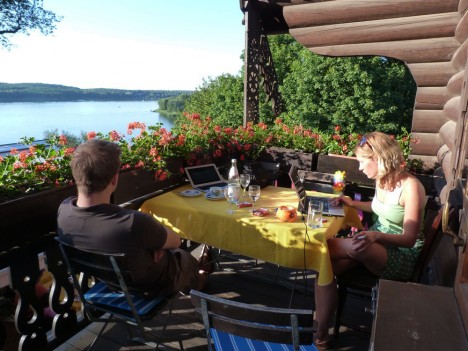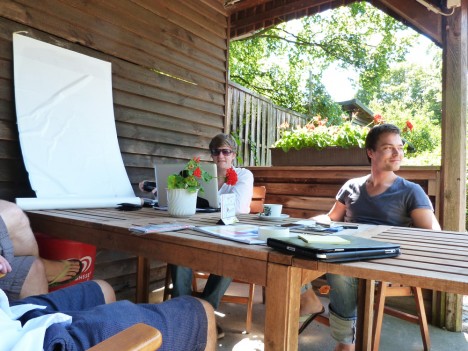One week at the Workation Week’s picturesque location isn’t exactly the same as spending time at a coworking space. But a bright and friendly shared atmosphere is at the center of both concepts. It’s important that both the people around you and the location itself are enjoyable – even with your best comrades you wouldn’t like to work in a prison, would you?
"I believe many people lack a sense of how important environment is for the overall work process," said Simon Blake from the Workation Week Berlin. Many companies try to make their locations comfortable for their clients, but: "I think it's important to give your own people the same."
The name Workation Week suggests that you might be working during your vacation time. But the meaning is actually the opposite. “It should be work that is like a holiday. I want to give people the chance to enjoy the summer sun without a guilty conscience. This is one way to do that.”
But is it possible for people to get work done during such a short period, with a postcard view in front of them? The first Workation Week in Berlin, held in June, proved that it is. “There were a lot of people who didn’t know each other at all. Ten minutes after the first meeting, everything was super quiet. You could only hear the sound of clicking.”
It turns out the peer pressure was motivating. “I think people were initially expecting nice, but not hard, work. They brought with them their easier projects, but found that they could actually create something in our location. Such a space is inspiring, but it’s also a discipline issue. I got a lot of positive feedback in the end. Many people said they hadn’t had such an enjoyable working period, with the emphasis on working.”
Simon came up with the concept after he heard that some companies send their employees to Berlin’s Betahaus for a working week. “I wondered what Berliners – who can experience this kind of workplace every day – would do as an equivalent.” He then thought of the many lakes and castles in Berlin and its surrounding as a potential destination.
Contrary to expectation, the people who registered for the first Workation weren’t long-time Berliners, but new arrivals to the city. After the first experiment, Simon decided to give the concept a second go over three days in August.
The Workation Week isn’t the first project for work at holiday locations. Many companies offer their employees holiday trips, but they aren’t necessarily focused on getting work done. There are also many conference hotels which offer the opportunity to get work done, but most of them built a traditional work atmosphere inside. So far, there are just a few exceptions like the Hotel Miramonte in the Austrian town of Bad Gastein, the Chatelier in South France, or the Club of Marrakesh: “Ultimately, they’re different from Workation Week, because we use unusual locations on a temporary basis.”
And what experiences and tips can Simon offer about keeping work and leisure separate? “I know from my own experience working in agencies, which got rid of their work clocks in the 90s. People were supposed to be able to work when they wanted. But in my experience, it meant people worked more than the time they were paid for. That’s why I try to keep a strict separation, even if it’s not always possible.”
Ultimately it depends on how a person structures their workload. “As a freelancer, it’s both the easiest and most difficult thing. It’s a question about priorities and limits, for instance, about whether a person decides to answer e-mails after 8pm. I personally do not. Because once other people see that you work to this rhythm, they begin to expect it. It’s really hard especially for projects you like. But it is important to mark out a boundary, and to focus better during the time you have limited for it.”
“Then it’s also a question of maintaining your boundaries. When you’re in a new job or team, often you feel you have to adjust to their working rhythm. But I’ve personally found that you don't need to follow their rhythm.”
:::::
Workation Week Berlin
Aug. 31 - Sep. 2, 2011
Look for more events on WorkationWeek.de or WorkationWeek.ch















